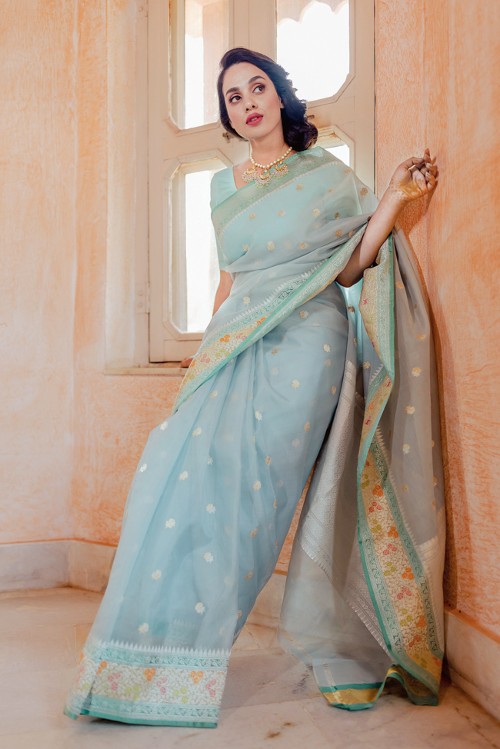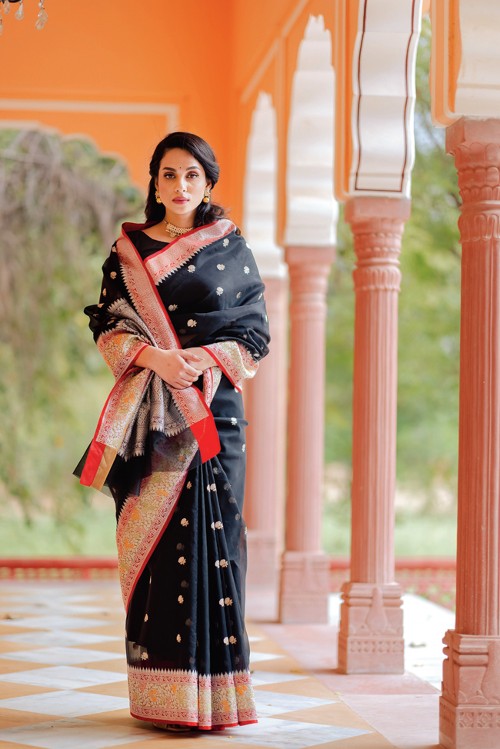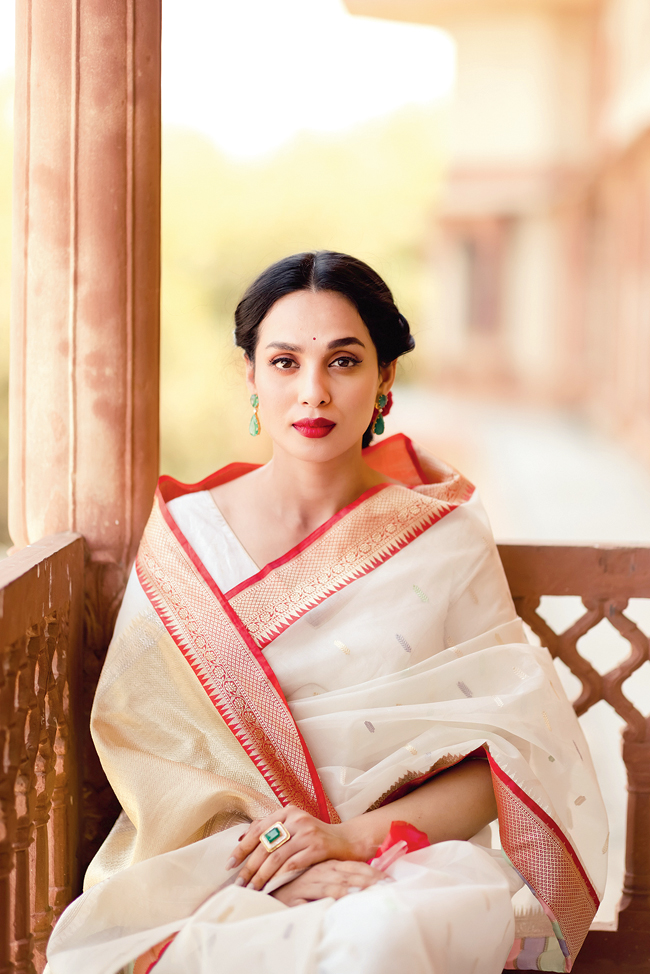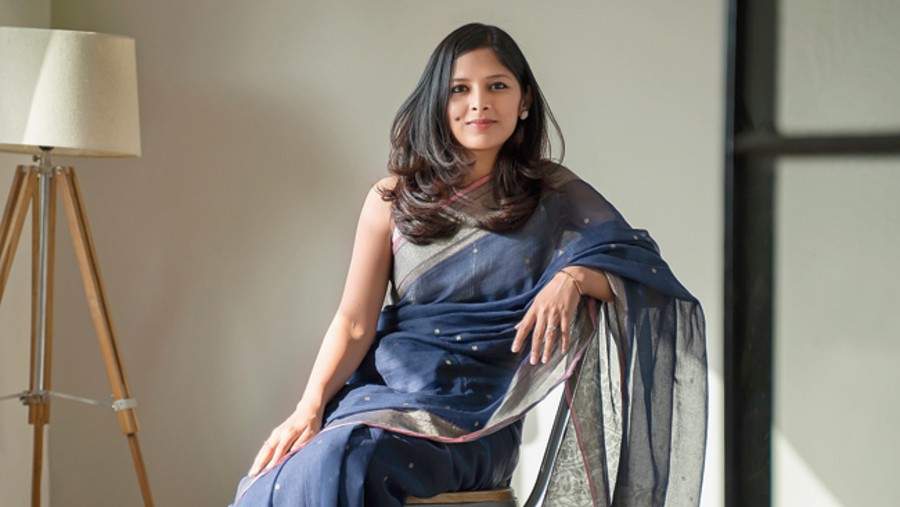We had last met Aditi Chand, the CEO and co-founder of Benaras-born brand Tilfi, in 2019. “We have saris across the spectrum of Benarasi… people have a very narrow notion of what Benaras does or what a Benarasi sari is. It’s just the red, very heavy brocaded version, but Benaras repertoire is very wide. We are from Benaras and we have been doing this for generations. It’s our speciality. Whether it is the kadwa janglas that Calcutta is so familiar with or the koras which are more ethereal,” she had told us. Tilfi’s new range of kora silks are just that. Ethereal, with a touch of the vintage. Aditi took The Telegraph through the collection and her plans for the brand in the coming years.
Nagma looks so pure. And, the name has so much poetry to it. What do you love about koras?
I find kora silks absolutely ethereal. Diaphanous and lightweight, the fabric has an inescapable elegance. Also, I love how koras tend to be slightly fluffy when freshly woven and settle down softly over a few wears, but never quite embrace the curves of one’s body — keeping the drape breezy and not so structured. There is a certain carelessness in how one can drape a kora and still look like a picture of perfect poise!
We love how soothing yet happy the saris are...
By its very nature, kora is a soothing fabric. Whether woven in pastels or in deep tones, the colours never look perfectly saturated due to the fabric’s semi-sheer quality. At Tilfi, whenever we are designing a pattern, choosing our colours or balancing the palette, we always gravitate towards the choices that we find most harmonious and aesthetically pleasing. The result is always something that channels happiness.
Which sari resonates with you personally?
I love the play of colours in the ‘Chaitra’ sari and even the singular absence of colour in the ‘Kartika’.
Since we are talking about Nagmas, which song brings alive the romance of saris the best?
A few years ago, we had the great privilege to have our guru, Padma Vibhushan Pandit Chhannulal Mishra sing for us. He introduced us to a folk song that narrates the tale of a young bride urging her husband to bring her a Benarasi. To me, no song captures the romance of a sari better than this one!
Since Tilfi’s birth, what kind of sari love have you seen among the millennials? Do you get a lot of millennial buyers?
Tilfi was launched in 2016, so over the last few years, there has been a revival of interest in saris and a greater appreciation for heritage textiles amongst millennials. Many more are embracing the sari for special occasions in their life or choosing to experiment with it.
We do get a lot of millennial sari buyers. A huge proportion of our customers fall in the 25-35 age bracket. Collections like Balance, Modern Classics, Kashi, Tanchoi Rhymes, and Terra have found great success amongst them. We also get a lot of interest from millennial brides looking for an investment piece — something which will go on to become a family heirloom.
The language of Tilfi is contemporary. What did you have in mind when you had set out?
At Tilfi, our design aesthetic carefully builds on the rich vocabulary of Benarasi textile traditions and our creations do not present a drastic departure from it. Our constant challenge is to innovate and create something new while trying to do justice to a design language that has been perfected over centuries.
Many of our weaves are decidedly traditional, but each is unique in its artistry, authenticity of materials and craftsmanship, each a sublime realisation of complex know-how. Our ambition was and continues to be to keep pushing the boundaries of our craft and the skills of our artisans, while staying true to the quintessence of Benarasi craftsmanship.
Can you tell us about your motifs?
We build each collection around a central idea — either to play with a particular fabric or a weaving technique, or a family of colours, or patterns and motifs. Isolating an area of experimentation clarifies our creative process. Along with this, we also decide the overall vibe and tonality of the collection. For instance, in the case of Nagma, we chose to play with kora silks, in the bootidaar format and the overall mood was one steeped in nostalgia. This ultimately reflects in all our choices — of colours (soft), materials (antique zari) and delicacy of patterns (fine, intricate).
In true Benarasi tradition, many of our motifs are inspired by nature and the things we see around us. A new design is not always one that introduces a novel motif — the ubiquitous rose can be rendered in a thousand different ways to great effect each time. Having said that, we also continue to introduce new motifs into our weavers’ repertoire. With our collection O’ October, we introduced flowers such as hydrangeas and camellias, unfamiliar to Benarasis. With our iconic Kashi, we gave our weavers and our patrons a completely different perspective on their beloved city.
What is a classic sari for you? Your favourite piece from Tilfi would be…
Italo Calvino once said that “A classic is a book that has never finished saying what it has to say.” I believe the same to be true for saris. A classic sari will continue to speak to you in myriad ways over the years. My favourite Tilfi piece is the Hunar sari, a katan silk drape with a plain body and an elaborate zari border, patterned with spinning wheels and bobbins, “charkhas” and “naris” — the simple tools of our master artists. I love it for what it represents.
What are your other favourite weaves apart from Benarasi?
I love the artistry and subtle beauty of Patan Patolas and Dhakai Jamdanis.
What does Tilfi want to try in the coming years?
In garments, we are working to develop clothing which can contemporise our heritage textiles and present opportunities for women across the globe to be able to experience the quality of our talent.
In weaves, we want to keep challenging ourselves and our artisans to continue producing the finest pieces of handloom craftsmanship possible in the world today. To this end, we hope to commission pieces of increasing rarity and dabble in the territory of textile art.
We also plan to explore the potential of other crafts of Benaras. We have experimented with some of these for our experiential retail space in Varanasi and feel that there is much more that can be done in keeping with Tilfi’s mission to create purposeful pieces of exquisite artistry.













